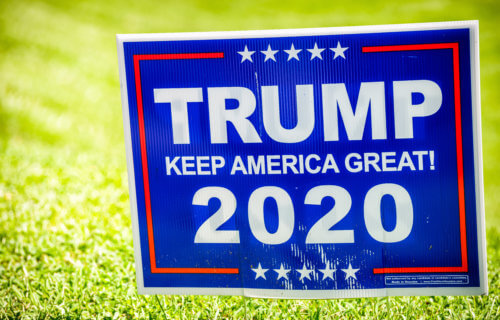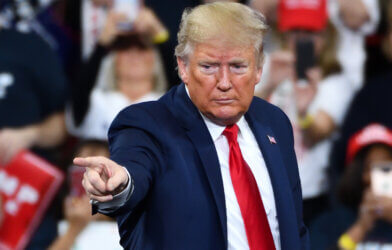UNIVERSITY PARK, Pa. — It’s not uncommon to see signs and banners at Trump rallies with an image of President Trump’s head superimposed on a comically muscular body. For some, it can be bizarre and puzzling sight. Now, however, Penn State researchers may have an explanation as to why so many Trump supporters view the 45th president as an action movie hero. Their study contends that both men and women who believe in “hegemonic masculinity” — the belief that men should be strong, dominant, and tough — are much more likely to support and vote for Trump.
Notably, researchers say the findings hold true even after accounting for other factors such as political party and level of trust in the U.S. government.
According to Nathaniel Schermerhorn, a dual doctoral candidate in psychology and women’s, gender, and sexuality studies, these findings suggest that while American society may be ready in theory for a female president, hegemonic masculinity must first be rejected before that ever becomes a reality.
“The pervasiveness of hegemonic masculinity exists because we do not always know that our attitudes and behaviors are contributing to it,” he explains in a university release. “The success of Donald Trump’s 2016 campaign shows that even if we, as a society, have made progress in saying that discrimination and prejudice is undesirable, we have not, as a society, fully interrogated the systematic ways in which those prejudices are upheld.”
An uphill battle for female politicians
There have been many positive changes for female politicians in America in recent decades. Despite those achievements, U.S. politics have largely been dominated by men since the Declaration of Independence was first signed. Due to this fact, study authors say modern political campaigns continue to focus heavily on masculine characteristics and traits.
“Historically, American politics have been a masculinity contest about proving which candidate is better,” Schermerhorn says. “Since the 1980s, the Republican party has used this to their rhetorical advantage by presenting the Republican candidate as masculine and feminizing the entire Democratic party, for example by calling them ‘snowflakes.'”
Those ideas have been on display throughout Mr. Trump’s two presidential campaigns. This includes using nicknames like “Little Marco” to “Sleepy Joe,” to attacking his foes’ masculinity or competency. While running for office against Hilary Clinton in 2016, the Penn State team argues he utilized similarly sexist attitudes to position himself as a much stronger option for president.
Co-author Theresa Vescio says there isn’t necessarily anything wrong with supporting these ideas about what really makes a man masculine. The reality however, is that few can live up to such expectations.
“In contemporary America, idealized forms of masculinity suggest that men should be high in power, status and dominance, while being physically, mentally and emotionally tough,” the researcher says. “But this is an incredibly high standard that few can achieve or maintain. Therefore, this is an idea that many men strive to achieve, but few men actually exhibit.”
Masculinity and the voting booth
To reach these conclusions, study authors gathered a group of 2,007 people for seven experiments. The first six tests involved participants answering a series of questions. These gauged their beliefs surrounding hegemonic masculinity, government trustworthiness, racism, sexism, homophobia, and xenophobia. Participants also disclosed their personal political affiliations, who they voted for in 2016, and general thoughts on Trump and Clinton.
The seventh experiment was very similar to the first six, except this time participants were also asked who they were planning to vote for in the 2020 election. They also gave their overall thoughts on the president and his opponent, Joe Biden.
Across all seven experiments, researchers find participants who show a strong belief in hegemonic masculinity are more likely to favor and vote for Donald Trump. This held true across several demographics including men, women, whites, minorities, Democrats, and Republicans.
“Additionally, we found that stronger endorsement of hegemonic masculinity was related to greater sexism, racism, homophobia, xenophobia, and Islamophobia,” Vescio reports. “But, hegemonic masculinity continued to predict support for Trump even when controlling for these prejudices.”
Is a macho attitude the status quo?
Since hegemonic masculinity appears to be deeply ingrained in American culture, researchers speculate that many people may subconsciously associate it with a greater status quo.
“While endorsing hegemonic masculinity predicted a higher likelihood of supporting Trump, it did not necessarily predict negative support for Democratic candidates,” Schermerhorn concludes. “This could suggest that hegemonic masculinity may actually be a predictor of maintaining the status quo and not the inverse — working against the status quo.”
The study is published in Proceedings of the National Academy of Sciences.



